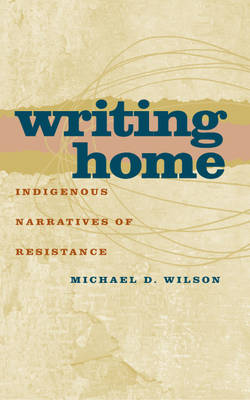
- Afhalen na 1 uur in een winkel met voorraad
- Gratis thuislevering in België vanaf € 30
- Ruim aanbod met 7 miljoen producten
- Afhalen na 1 uur in een winkel met voorraad
- Gratis thuislevering in België vanaf € 30
- Ruim aanbod met 7 miljoen producten
Omschrijving
In Writing Home, Michael Wilson demonstrates that the use of acceptable Western literary forms by indigenous peoples, while sometimes effective, has frequently distorted essential truths about their cultures. Sermons, for instance, have provided some indigenous authors with a means to criticize colonialism; but ultimately this institutional form, by its very nature, expresses a hierarchical relationship between Christian religions and indigenous beliefs and practices. Similarly, autobiographies are useful vehicles for explaining the cultural practices of a particular tribal group--or personalizing the destructive forces of colonialism--yet the autobiographical form itself suggests an ethos of individualism entirely contrary to a vision of communal identity central to many indigenous groups. Short fiction and novels are often built around conflict. Although indigenous writers have used this thematic approach with considerable artistry to express the clash between indigenous societies and the forces of colonialism, for many indigenous people the idea of conflict as the basis of cultural expression may be antithetical to a relational, perhaps familial, attitude toward the world and other people. Writing Home explores the ways that indigenous writers use ideas and structures from primarily oral traditions to resist, for example, colonial metanarratives that legitimize and even demand the disappearance of indigenous peoples--Manifest Destiny, Social Darwinism, and the inevitable plight of the tragic "mixed blood." To this end, Wilson examines selected works by Mourning Dove (Humishuma), Leslie Marmon Silko, Gerald Vizenor, Louise Erdrich, and Ray Young Bear. In the effort to create a mimetic form of representation that is appropriate to their cultures, these writers, Wilson finds, confront issues of authenticity, identity, and society. Ultimately, Wilson's investigation reminds us of the difficulty and ingenuity required to rescue an authentic written representation of a culture from the distortions caused by the colonialist's "accepted" representational structures.
Specificaties
Betrokkenen
- Auteur(s):
- Uitgeverij:
Inhoud
- Aantal bladzijden:
- 188
- Taal:
- Engels
- Reeks:
Eigenschappen
- Productcode (EAN):
- 9780870138188
- Verschijningsdatum:
- 1/04/2008
- Uitvoering:
- Paperback
- Formaat:
- Trade paperback (VS)
- Afmetingen:
- 151 mm x 229 mm
- Gewicht:
- 344 g

Alleen bij Standaard Boekhandel
+ 69 punten op je klantenkaart van Standaard Boekhandel
Beoordelingen
We publiceren alleen reviews die voldoen aan de voorwaarden voor reviews. Bekijk onze voorwaarden voor reviews.









